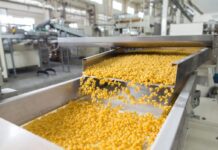
Media Release by MYOB
Australian mid-sized manufacturers have experienced solid growth and are feeling optimistic for the year ahead, with investment in innovation front of mind, according to new research from business management platform MYOB.
More than half (55%) of respondents report increased revenue compared to a year ago, almost two-thirds (62%) have more work than usual in the pipeline for the next three months, and 54% predict their revenue will be up in the next 12 months.
The latest Mid-market Snapshot of 181 mid-sized manufacturing businesses (with 20-500 employees) reveals innovation to be a key driver of the sector’s success, as well as a method for futureproofing against anticipated changes in the industry.
MYOB General Manager – Enterprise, Kim Clarke, said that despite a raft of external challenges, it’s encouraging to see optimism growing amongst mid-market manufacturers, with the upward trajectory set to continue.
“From significant supply chain disruption, to increasing costs, staff shortages and ever-changing customer demand, Australian manufacturers have demonstrated resilience in an uncertain market.
“It is important to recognise that this hasn’t come from resting on their laurels. Businesses we’ve polled are clearly thinking about, and investing in, ways to ensure that they are future proof, resilient and ready to take advantage of opportunities. Innovation is a particular focus, helping to bolster their success,” she added.
Investing in innovation
Seventy per cent of Australian manufacturers surveyed said they have invested in innovation over the past 12 months. More than 8-in-10 (83%) respondents say innovation is a key priority for their business, and over three-quarters (78%) have ambitions to scale their business over the coming year.
Forty-seven per cent said they allocate a yearly spend for innovation, of those who do, more than a third (39%) budget over $50,000.
Of the businesses looking to innovate their operations in the next 12 months, the majority of those polled (44%) want to improve production lines, while more than a third (35%) want to tighten or improve their supply chain, and 33% want to expand services to customers and clients (on top of their usual offering). The same proportion (33%) are planning more automation of manual processes.
“For local manufacturers planning to innovate further over the next year, the reasons driving this are clear.
From improving their bottom line, to streamlining operations, to giving team members time to focus on higher value tasks. These outcomes can all significantly impact a business’s performance for the better,” Ms Clarke said.
“The manufacturers taking action will reap the rewards.
“Strong performance and ambitions notwithstanding, the manufacturing industry has – and continues to face – three key challenges including rising cost of goods sold (COGS), supply chain disruption and challenges around workforce shortages.”
Fifty-five per cent surveyed are feeling the burden of the increased costs of goods and 50% experiencing disruptions to their supply chain. More than a third (39%) are seeing an increase in the cost of their business overheads, the same percentage face a shortage of skilled workers.
These same challenges are expected to be the most prominent obstacles over the next six months, and 40% of manufacturers polled believe that global supply chain issues will continue to impact their business for at least another year.
Change and transformation
Despite these challenges, the innovation undertaken has put mid-sized businesses in good stead for the future with many gearing up for transformation in the industry more broadly.
Eighty-one per cent of respondents predict that the manufacturing industry will rapidly change in the next five years, with the most significant being: more automation (55%), more competition (43%), bigger businesses buying up smaller businesses (42%) and more manufacturing coming back to Australia (32%).
“While businesses need to remain responsive to fluctuating economic environments, new challenges, and customer demands, there are certainly some clear themes emerging across the industry. Key to successfully navigating these external variations will be a holistic approach to change internally – from production workflows to business management systems – and digitisation is an integral component,” said Ms Clarke.
“Nearly a third of manufacturers we surveyed want to have more than 50% of their business digitised in future, but with more competition predicted in the sector over the next five years, the time to do this is now.
“The Australian manufacturing industry is a great case study in using modern solutions to facilitate a more iterative, creative approach to business. With rapid change predicted, along with strong investment for future-proofing operations and an increase in Australian manufacturing, we’re excited to see a new chapter of growth in the sector”.



















